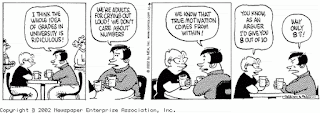Mentor-Teacher-Hybrid Presence-course design...

This semester is turning out to be one that is quite busy. It was a good idea to not teach a graduate this semester so I can focus on my dissertation proposal, however (like that irresistible desert at the end of the meal) various collaborative projects have come in to fill the "void" left in my schedule from not teaching (the one that is supposed to be going into dissertation prep), and these projects have me thinking. First is the aspect of Hybrid Presence. Suzan and I coined this term to describe something between Teaching Presence and Learner Presence for the most recent Networked learning conference. We are currently working more on this topic for an upcoming book chapter. Second is gamification. A term that has come in and out of my list of curiosities that I want to play around more with. I've done some work on this for school, and for professional organization presentations, but nothing big in terms of an article (in my ALECS proposal it wa...















